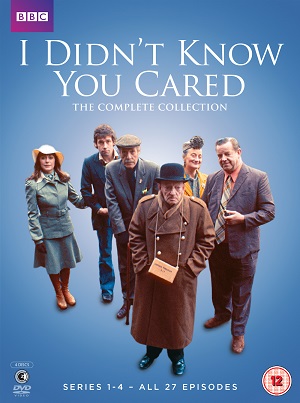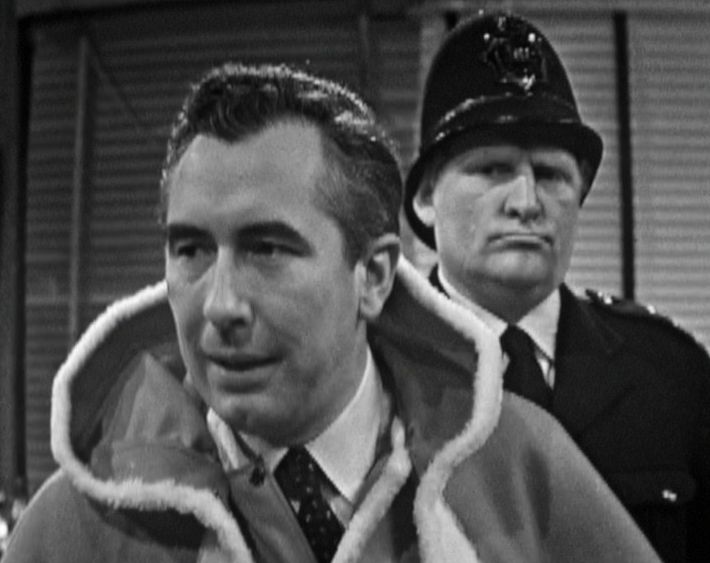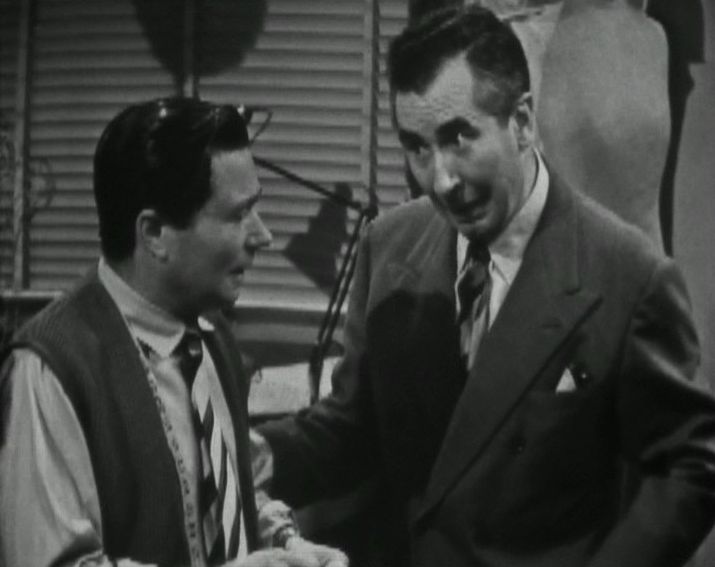
Peter Tinniswood (1936 – 2003) first came to prominence in the 1960’s, collaborating with David Nobbs on The Frost Report and also penning Lance at Large, a sitcom built around the talents of Lance Percival. He also pursued a career as a novelist and two of his books – A Touch of Daniel (1971) and I Didn’t Know You Cared (1973) – would form the basis of his most enduring television creation.
The television version of I Didn’t You Know Cared, adapted loosely by Tinniswood from his novels, ran for four series between 1975 and 1979 (a third novel, Except You’re A Bird, was published in 1976). Although the series was popular at the time, it sadly doesn’t have a very high profile these days. Some maintain this is because of its strong Northern atmosphere, but I’m not sure this is so – after all, it bears some similarities to Last of the Summer Wine, and that’s a series which has always had broad appeal.
The comparison with LOTSW is a fair one (and not least because John Comer appeared in both series). They both depict worlds where married life is a constant battle, with neither side giving any quarter. In I Didn’t Know You Cared it’s the formidable Annie Brandon (Liz Smith) who rules the roost with considerable relish.
The opening episode, Cause for Celebration, sees Uncle Mort (Robin Bailey) bury his wife Edna (who had the bad luck to fall off a trolleybus onto her head). Mort doesn’t exactly seem heartbroken – fretting that because the funeral’s taking so long he’s going to miss the football results – but later does admit that he’ll miss her. “She was a dab hand at plumbing you know. God knows who’s going to paint the outside of the house now she’s dead.” But every cloud has a silver lining and he’s happy that from now on he’ll be able to wear his cap at the dinner-table.
Bailey tended to play upper-class most of the time, so the earthy Northerner Mort was something of a departure for him. But he’s never less than excellent and thanks to Tinniswood’s pithy dialogue he’s always got plenty of good material to work with.

Mort sneaks away from the funeral party with his brother-in-law Les (John Comer). If Mort is starting to relish his new found freedom, then spare a thought for Les, shortly due to celebrate twenty five years of marriage to Annie. She wants a second honeymoon, whilst Les doesn’t seem to have recovered from the first. As Mort and Les seek refuge and a nice cup of tea in the comfortable hut at Mort’s allotment (Mort grows weeds, explaining to Les that they’re much better than sprouts) they muse over the mysteries of marriage. Les believes that having to marry a woman is where the trouble starts – if he could have chosen anyone, he’d have picked King George VI! They’re joined by Les’ son Carter (Stephen Rea), and after a few moments Mort decides that “t’fly in ointment is the human reproduction system.”
How much better would it be, Mort says, if a woman laid an egg and sat on it for nine months. “Just think, she’d be stuck in t’house for nine months, sat on her egg. She’d have no excuse for coming to t’pub with you then.” Carter sees a flaw in this admirable idea though – why couldn’t she put the egg in the oven for a bit? After considering this, Mort decides that it wouldn’t work, not with the way that gas pressure is like these days. “You couldn’t rely on it. Just think what would happen. You’d put your oven on at regulo 2, you’d stick you egg in it, you’d nip out for a couple of gills. When you come back you find t’gas pressure’s gone up and your potential son and heir’s turned into a bloody omelette.”
Alas, their peace and quiet doesn’t last for long as Annie tracks them down. She depresses Mort by telling him that he’s going to come and live with her and Les (so he won’t be sneaking down to the pub every night and doing exactly what he pleases). Carter also has the sense that the walls are closing in on him after he’s forced to stop prevaricating and propose to Pat (Anita Carey). Well I say propose, but his mumbled words fall a little short of that – no matter to Pat though, she’s now steaming full ahead and starts by asking him if he’d like a son or a colour television first …
In the space of thirty minutes Tinniswood has set everything up nicely – Annie and Les, Carter and Pat, plus Uncle Mort. Not to mention Uncle Staveley (Bert Palmer) hovering in the background, constantly asking “pardon?”
During the first series we see the preparations for Carter and Pat’s marriage. Mort and Les, old hands in the marriage game, are keen to give him the benefit of their experience (they both think it’s a very bad move). Unsurprisingly Pat don’t find this terribly helpful. By series two they’ve tied the knot, although Carter’s finding it rather difficult to adjust to married life. Both Rea and Carey left after the second series, so Keith Drinkel and Liz Goulding took over the roles for the final two series (Leslie Saroney replaced Bert Palmer as Uncle Stavely for the fourth and final series).

The endless conflict between men and women is explored in the series two episode A Woman’s Work. Mort is depressed at having to spend all day trapped in the house with only Annie and Pat for company. He eyes Les and Carter with envy – they’ll soon be setting off to the factory for a day of filth and squalor (he tells them they don’t know how lucky they are!)
Familiar Tinniswood tropes come to the fore – not only do the women do all the housework (which goes without saying) but they also deal with the household maintenance as a matter of course. Annie recalls the problem they had with the guttering, which wasn’t helped by the fact she was stuck on the roof for six hours after Les took the ladder away. He tells her there was a good reason – he had to repair a hole in the snooker club roof – and he doesn’t seem to appreciate that she may have had different priorities.
Carter and Pat are now married and Pat is eyeing their new home. Anita Carey continues to impress as Pat, an upwardly mobile woman who embraces the new. She’s very taken with the qualities of their potential new neighbours (mainly because of the gadgets on their cars) and is also keen to mould the reluctanct Carter into a new man. This isn’t going to be easy though ….
Mort’s reminisces of his married life are another of the episode’s highlights – especially the moment when he recalls how Edna would demand her conjugal rights every Saturday evening. “Oh ‘ell, I’d say. Can I keep me pyjama jacket on? Undiluted bloody agony.”
Paul Barber pops up in a couple of episodes, including this one, as Les and Carter’s factory colleague Louis St. John. The dialogue Barber has is a little awkward (for example, when asked if he had a good weekend he says that he “took the awd lady to t’witch doctors on Saturday, had a couple of missionaries for Sunday lunch”). Another familiar face lurking in the factory is John Salthouse as the impressively-named Rudyard Kettle. Salthouse would later play DI Galloway in The Bill.
Tinniswood’s dialogue remains endlessly quotable. In a later series two episode, You Should See Me Now, Annie recalls that the last time her husband took her out alone was the week after the Second World War ended. “We went to hotpot supper at Moffat Street tram sheds.” With just a single line Tinniswood is able to paint a very vivid picture.
Taking over roles played by someone else is never easy, but both Keith Drinkel and Liz Goulding fit very nicely into the third series as the new Carter and Pat. The opening episode – Men at Work – develops the theme from A Woman’s Work. There we saw Mort going a little stir-crazy, trapped in the house all day, now matters are made even worse as he’s joined by Les and Carter, both of whom are out of work. They react to the spectre of unemployment in different ways – Carter is building a model battleship painfully slowly whilst Les becomes an efficient house-husband (Comer looking fetching in a pink pinny).
The fourth and final series opened with The Love Match. This sees the Brandons throw a posh dinner-partly at which Les mournfully notes that they must be having peas since there’s three forks on the table. Annie is in a much more positive mood though. “It must be years since I got dressed up in a long frock and squirted scent under me armpits.” It must be said that Liz Smith does look rather, well rather …..
Other highlghts later in the series include Mort’s unexpected expressions of love (given all he’s previously said about the horrors of married life this is more than a little surprising). An especially strong episode is The Great Escape, which sees Pat tell Carter that she’s planning to spend two nights away on business. Poor Pat wants Carter to be absolutely incensed and jealous with rage, but the phelgmatic Carter is his usual calm self. There’s a darker tone to this one though, as Carter’s eyeing the voluptuous charms of Linda (Deidree Costello) even as he’s bidding Pat farewell. But when Pat is hospitalized shortly afterwards, a stricken Carter is forced to abandon his escape plans. Drinkel, sitting by the unconscious Pat’s bedside, plays the scene very well.
With uniformly strong performances from all of the main cast (especially Bailey, Comer and Smith) and sparkling dialogue from Peter Tinniswood, I Didn’t Know You Cared is an obscure sitcom gem. But with writing and acting as good as this it deserves to be much better known.
I Didn’t Know You Cared is released by Second Sight on the 28th of November 2016. RRP £24.99.











































